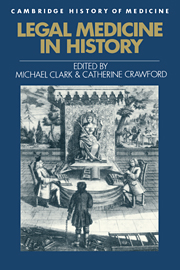Introduction
Published online by Cambridge University Press: 08 January 2010
Summary
This book presents new research on the history of legal medicine from the early seventeenth century to the 1960s. It ranges widely in subject matter, from abortion and infanticide to medico-legal education and the politics of the coronership, while its geographical scope extends from colonial Maryland and Enlightenment Germany to Belle Epoque Paris and twentieth-century England. However, this book is not just a sampler of current historical work on legal medicine. It is intended to form a coherent historiographical intervention in a field which has long been studied largely in isolation from social, political, and even legal history.
Much existing historical work on legal medicine lacks a sufficiently strong sense of the ways in which particular historical settings have affected the development of medico-legal knowledge and practice. For want of adequate contextualization, scientific and technical advances have usually been understood in self-referential terms. At the same time, historians' view of not only the history of criminal justice but also, for example, the history of women and the family, of local government, and of health and safety at work has been limited by lack of awareness of their medico-legal aspects. Our aim in this book is to show what the history of legal medicine stands to gain from new approaches to the social history of law and medicine, and to explore some of the ways in which medico-legal history can enrich our understanding of history in general.
- Type
- Chapter
- Information
- Legal Medicine in History , pp. 1 - 22Publisher: Cambridge University PressPrint publication year: 1994



